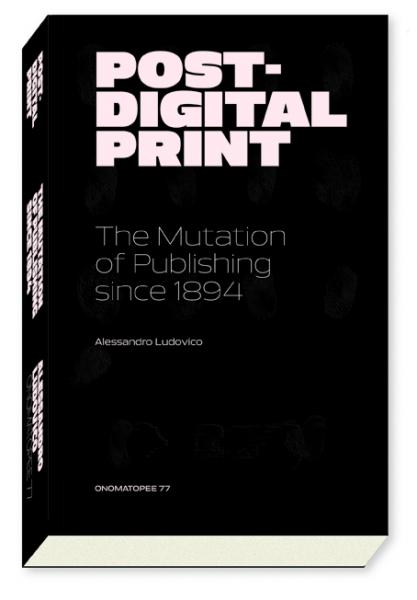Alessandro Ludovico: Post-Digital Print: The Mutation of Publishing Since 1894 (2012–) [EN, IT]
Filed under book | Tags: · archive, book, e-book, filesharing, library, networks, print, publishing, reading, text, writing

“In the post-digital age, digital technology is no longer revolutionary but a normality, everywhere. For music or film, circulation as bits and bytes, downloads and streams are no longer a big deal. But for the world of book and magazine publishing, change has just begun.
New ways of networked and electronic publishing had been envisioned by avant-garde artists, activists and technologists for more than a century. Even though in hindsight the reports of the death of paper were greatly exaggerated, electronic publishing has now become a reality. How will analog and digital coexist in the post-digital age of publishing? How will they transition, mix and cross over?
In this book, Alessandro Ludovico rereads the history of avant-garde arts as a prehistory of cutting through the opposites of paper and electronics. He covers, among others, artists’ books and manifests, zines, net art and experimental publishing projects, up to e-readers and print-on-demand.”
With Afterword by Florian Cramer
Publisher Creating 010, Hogeschool Rotterdam & Onomatopee, Eindhoven, May 2012
Onomatopee 77: Cabinet Project
Creative Commons Attribution-NonCommercial-ShareAlike 3.0 Unported License
ISBN 9789078454878, 9078454873
192 pages
via Florian Cramer
Interview with author: Teresa de Andrés (VisualMag, 2012).
Reviews: Franz Thalmair (Springerin, 2012), Regine Debatty (We Make Money Not Art, 2013), Rob Myers (Furtherfield, 2013), Paul Prudence (Neural, 2013), brnrd.net (2013), Kate Cunningham (Yapp, 2014), Eloïse Cariou (Critique d’art, 2016, FR), Benjamin Caraco (BBF, 2017, FR).
Book launch (Eindhoven, 2012)
Post Digital Print (series of activities around the publication, 2012)
Book website
Publisher (EN)
Publisher (IT, archived)
WorldCat (EN)
Wikipedia
Post-Digital Print (English, 2012, updated on 2012-5-31 to the latest version of the book, Internet Archive)
Post-digital print. La mutazione dell’editoria dal 1894 (Italian, trans. Alessandro Ludovico and Rosa Antonicelli Verrelli, 2014, added on 2020-6-3)
David G. Post: In Search of Jefferson’s Moose: Notes on the State of Cyberspace (2009)
Filed under book | Tags: · cyberspace, database, dns, filesharing, intellectual property, internet, networks

A leading Internet authority applies the political thought of Thomas Jefferson to the issue of how cyberspace should be governed.
In 1787, Thomas Jefferson, then the American Minister to France, had the “complete skeleton, skin & horns” of an American moose shipped to him in Paris and mounted in the lobby of his residence as a symbol of the vast possibilities contained in the strange and largely unexplored New World. Taking a cue from Jefferson’s efforts, David Post, one of the nation’s leading Internet scholars, here presents a pithy, colorful exploration of the still mostly undiscovered territory of cyberspace–what it is, how it works, and how it should be governed.
What law should the Internet have, and who should make it? What are we to do, and how are we to think, about online filesharing and copyright law, about Internet pornography and free speech, about controlling spam, and online gambling, and cyberterrorism, and the use of anonymous remailers, or the practice of telemedicine, or the online collection and dissemination of personal information? How can they be controlled? Should they be controlled? And by whom? Post presents the Jeffersonian ideal–small self-governing units, loosely linked together as peers in groups of larger and larger size–as a model for the Internet and for cyberspace community self-governance. Deftly drawing on Jefferson’s writings on the New World in Notes on the State of Virginia, Post draws out the many similarities (and differences) between the two terrains, vividly describing how the Internet actually functions from a technological, legal, and social perspective as he uniquely applies Jefferson’s views on natural history, law, and governance in the New World to illuminate the complexities of cyberspace.
In Search of Jefferson’s Moose is a lively, accessible, and remarkably original overview of the Internet and what it holds for the future.
Publisher Oxford University Press, 2009
Law and Current Events Masters
ISBN 0195342895, 9780195342895
244 pages
PDF (updated on 2012-9-23)
Comments (2)International Journal of Communication, Vol. 6, with special sections: Info Capacity, Piracy Cultures (2012)
Filed under journal | Tags: · copyright, filesharing, information, intellectual property, internet, p2p, piracy, technology, web
The International Journal of Communication is an online, multi-media, academic journal that adheres to the highest standards of peer review and engages established and emerging scholars from anywhere in the world. The International Journal of Communication is an interdisciplinary journal that, while centered in communication, is open and welcoming to contributions from the many disciplines and approaches that meet at the crossroads that is communication study.
Special sections: Info Capacity, Piracy Cultures.
Features: Transnational Connections Symposium.
Editor: Larry Gross
Published by University of Southern California, Annenberg Press, Los Angeles, CA, 2012
PDF (PDF articles)
Comment (0)
